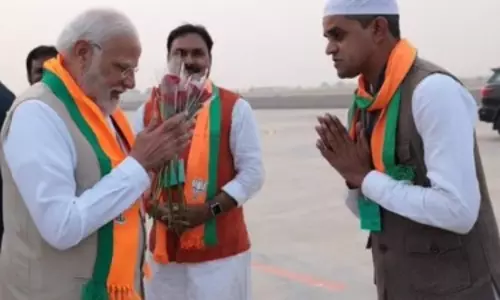
A move denying equality of opportunity
text_fieldsSaudi women winning their right to vote as well as the right to contest in the polls for local council seats for the first time in the landmark election was hugely celebrated by the media including the local media in India.
The media lauded Saudi Arabia for exhibiting liberality for incorporating women by rectifying their ultra conservative stand of keeping away a major section of the society from the democratic process. While analyzing the progress of the last three local polls, it could be found that the productive experiments to further widen the democratic system is being implemented phase by phase in the country where the monarch still rules the nation. While the media rejoiced the progress of democracy in Saudi Arabia, it failed to notice the barring of a large section of the population by the authorities from the democratic process in India known as one of the renowned models of Parliamentary democracy. In the north Indian state of Haryana, the Panchayat raj Act was amended early this year changing the eligibility criteria for those aspiring to contest in the local body polls. According to the amended law, the candidates contesting in the Panchayat polls, should be at least matriculate and for those from the reserved categories like Dalits and women should have passed class 8. Dalit women should have passed their class 5 for contesting in the polls. Besides the educational qualification, those with arrears of bank loans or electricity bills and no toilet facilities at home are disqualified from contesting. With the civic polls just around the corner, the ordinance that excluded a major part of the population from the democratic process reducing them to mere voters invited widespread criticisms.
The ruling BJP in Rajasthan, last year, had imposed educational qualifications as a pre-requisite to contest in the local body polls through an ordinance ahead of the impending elections. The Chandigarh High Court on August 22 stayed the operation of ordinance. Two weeks later, Haryana parliament passed the Panchayat raj amendment Bill converting the ordinance into law. The schedule of elections was announced the next day. When the case reached the Supreme Court, it ordered a stay on the elections on September 17. But the apex Court which again took up the matter, on Thursday ruled in the favour of Haryana government backing its decision. It upheld the validity of the Haryana Panchayati Raj (Amendment) Act rubbishing all the criticisms raised against it. A bench comprising Justice J Chelameswar and Justice Abhay Manohar Sapre in their judgement said that it was neither irrational nor illegal and that ‘it was only education which gives a human being the power to discriminate between right and wrong, good and bad’. The bench held that even though the right to vote and the right to contest were Constitutional rights, they could be ‘regulated and curtailed by appropriate legislature directly’. It noted that when the state government was providing Rs 12, 000 to every household for constructing a toilet, why it wasn’t being constructed. The Court also said that since elections at any level in the country were expensive affairs, the possibility of an indebted person seeking to contest elections should be rare as it would be beyond their economic capacity.
To comprehend whether the arguments put forward by the court which apparently makes sense is contradictory in real, the scenario in Haryana could be observed. Half of the population there doesn’t come even close to the pre-requisite announced. About 71.42 per cent villagers are illiterate and the womens’ literacy rate in the state is 66.8 per cent. The majority do not have rudimentary education other than knowing merely to write and read. However the irony is that there are no existing restrictions for contesting in the polls to the Assembly or the Parliament. The state of Haryana experiences severe agricultural arrears. It’s the various schemes and policies as well as bad governance that have landed the people into debts. The Court which hailed education necessary for distinguishing right from wrong has failed to notice that it was the educated few who have landed the state into such a crisis. The arguments that educational qualifications guide the local governments onto the right track are far from reality. If the state government that allowed financial assistance for constructing toilets had made efforts to know the actual estimates of whether the money reached the needy and the most deserving, the results would be pathetic. A majority would thus be denied of the fundamental right of equality of opportunity guaranteed by the Constitution. The essence of democracy signifies incorporating all sections of the society. Safeguarding the core of democracy by the judiciary which is one of the basic pillars of the democratic system is what is anticipated by the people.






















